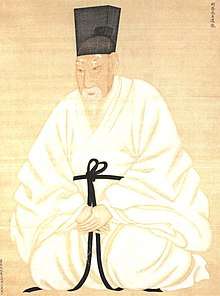Yun Jeung
Yun Jeung or Yun Chung (1629–1714) was a Confucian scholar in Korea during the late period of the Joseon dynasty. He was known as being a progressive thinker and for his opposition to the formalism and ritualism in the predominant philosophy of Chu Hsi. Yun Chung refused government office because he thought the Korean monarchy was corrupt, and spend his life teaching Sirhak ideas. He is known for the quote, "The king could exist without the people, but the people could not exist without the king."[1]
| Yun Jeung | |
 | |
| Korean name | |
|---|---|
| Hangul | 윤증 |
| Hanja | 尹拯 |
| Revised Romanization | Yun Jeung |
| McCune–Reischauer | Yun Chǔng |
Yun held ideological debates with Song Siyŏl, known as the Hoeni Sibi ("The Right and Wrong Between Song and Yun"), over the matters of ritualism and politics.[2]
Yun may also considered an early feminist, as he praised and honored female scholars of Confucianism, a position that was typically reserved for males.[3]
Works
- Myungjaeyugo (명재유고, 明齋遺顧)
- Myungjaeuiryemundap (명재의례문답, 明齋疑禮問答)
- Myungjaeyuseo (명재유서)
References
- Han Woo-keun (1971). "Chapter 22: Intellectual Developments in the Seventeenth and Eighteenth Centuries". In Grafton K. Mintz (ed.). The History of Korea. Translated by Lee Kyung-shik. East-West Center Press, Honolulu. pp. 324–5.
- Sun Joo Kim (2013). Voice from the North: Resurrecting Regional Identity Through the Life and Work of Yi Sihang (1672–1736). Stanford University Press. p. 73.
- Martina Deuchler (2003). "Female Virtues in Chosŏn Korea". In Dorothy Ko, JaHyun Kim Haboush (ed.). Women and Confucian Cultures in Premodern China, Korea, and Japan. University of California Press. pp. 150.
Bibliography
- Kang, Jae-eun; Lee, Suzanne (2006). The land of scholars: two thousand years of Korean Confucianism. Homa & Sekey Books. ISBN 1-931907-37-4.